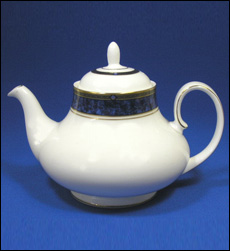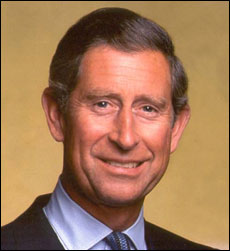Fri 18 Jun 2010
Royal Icing
Posted by anaglyph under Idiots, In The News, Insane People, Skeptical Thinking, Stupidity, WooWoo
[11] Comments
Good morning Faithful Acowlytes! I hope you got plenty of restful sleep last night because today you’ll need to have your wits about you as we start off with a quiz. This is the kind of quiz where I show you two images and you have to spot the differences between them. I’m sure you’ve done one of those before. OK, are you ready? Here we go then:


No? Look very very carefully. Still nothing? Hahaha! I apologize dear friends – I’ve tricked you with this one because image #1 is a teapot and image #2 is ALSO a teapot! In fact the only tiny difference between them is that the first one is a Royal Doulton, and the second one is a royal dolt.
Generally I try to refrain from picking on Royalty ((Well, except for King Willy of course – but he’s such good sport.)) here on The Cow because, well, it’s a bit too much like shooting fish in a barrel. I mean, it’s not their fault, really, is it? All those centuries of inbreeding does tend to take its toll. Luckily, most Royals are safely out of harm’s way for the most part, but sadly it doesn’t stop them from opening their mouths and gabbing when they have an audience.
If you know anything about the Prince of Wales you will be aware that he’s not a stranger to elliptical thinking. He has campaigned on behalf of homeopathy, freaked out about GM technology and now, in his latest escapade, blamed Galileo and science for the ills of the modern world.
In a presentation last week to the Oxford Centre for Islamic Studies, Prince Charles places culpability for all our climate problems on ‘mechanistic thinking’ which ‘goes back at least to Galileo’s assertion that there is nothing in nature but quantity and motion’. The prince thinks that the reason for our current environmental difficulties is because the Western world is having a ‘deep, inner crisis of the soul’.
This is a banal piece of reasoning that is as antiquated as the concept of the Royal Family itself. The Prince of Wales pulls one of the classic tricks of the religiously-inclined of equating a quest for knowledge with an abrogation of moral responsibility. In other words, science equals heartless amoral exploitation; religion ((The Prince doesn’t specifically campaign for religion as such, but it’s the same kind of thinking – the mention of ‘souls’ and the faux surprise when he says that he finds it ‘baffling that so many scientists profess a faith in God yet this has little bearing on the ‘damaging’ way science is used to exploit the natural world’ all mixes in to his diffuse religious view of how things work.)) equals warm and fuzzy caring and sharing. Even a schoolkid can see the stupidity inherent in this simplistic notion.
Prince Charles’ view of science as ‘cold and mechanistic’ is one that is beloved of science detractors and shows no understanding at all of scientists or scientific pursuit. Additionally, the Prince is either willful or stupid by ignoring (in favour of its perceived ills) the extraordinary benefits so obviously brought to us by science. How about the science that gave us the cure for smallpox, Your Highness? Or the science that has allowed millions of people access to clean water and nutritious food? How about the good deeds of the scientists who figured out how to clone insulin so that diabetics can have affordable treatment? How about the wonderful achievements of science that let us talk to our friends and family wherever they may be on the planet, at any time of the day or night? Or the science that allows us to make great adventures inwards to our consciousness and outward to the cosmos?
Like many of the purveyors of woo, the Prince of Wales wants it both ways; he eschews science because it is ‘evil’, but is quite happy to enjoy the countless improvements it brings to our lives. He blames science for our creating our ‘materialistic culture’ and for the ‘damaging way it is used to exploit the world’, yet offers no practical alternatives – just notions of vague, superficial, wistful magical thinking.
He advocates a world without science and without individual material aspirations. ((For the peasants, at any rate.))He pines for a world with a folky agrarian culture where superstitious thinking rules.
It’s not surprising in the end. Royalty has always done very well in such climates.




Th Prince said none o them things, Revrend …
… though, admittedly, it WAS hard to hear him, with that guy standin next to him bangin them coconut shells togethr …
All of us look the same to him anyway, completely covered in shit as we are.
I thought you weren’t picking on royalty, that is like picking on the kid with Down Syndrome.
… or throwin a rotten turnip at th village idiot …
I don’t know how I’d remain sane without you Polanski.
This made me cringe. Kind of like Oprah, or the people who think the Large Hadron Collider is going to destroy the planet.
My own view is that Oprah is going to destroy the planet.
Doesn’t he realise science is how we know the earth to be banana shaped? Talk about ungrateful.
Really? Shit. I always thought it was a donut.
Mmm, donuts.
On the upside, religion does give your enemies boils on their asshole so big they drag the ground. Does science do that?
I guess not yet.
Yeah but science can blast people with lasers, destroy their cities with atomic weapons and turn them into zombies with television.
I’ll stack those religious boils up against those odds any day.